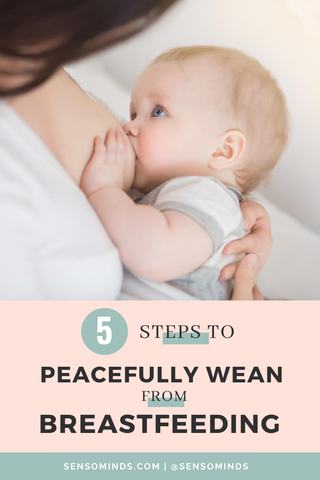So you've decided it's time to wean your baby off of breast milk?
For most moms, this is an emotional moment. Although the empowerment that comes with stopping breastfeeding can be wonderful, it also feels like the end of a special bond with your child.
When is it appropriate to avoid breastfeeding?
The World Health Organization suggests solely breastfeeding your baby for the first six months, and gradually adding solid foods while continuing to nurse your baby for another two years.
When your baby is 12 months old, you should start giving his or her regular milk from the refrigerator, much like the rest of the family. However, several parents chose to begin breastfeeding after the 12-month mark and that is totally fine.

Ultimately, you are the only one that can determine when it is time to end breastfeeding. You may want to worry about whether you'll go back to work and if you'll be able to pump feeds if you're not as close to your kid.
If at 12 months, your baby is still eating in the mornings and evenings, the milk supply should have changed accordingly.
3 signs that your baby is about to avoid breastfeeding
Though weaning from the breast may be solely up to you, your baby may show signs that he or she is ready to stop breastfeeding.
The signals that your baby is about to quit breastfeeding are mentioned below.
Your baby is not breastfeeding as much as before.
This is the most important hint. Your kid may be spaced out their feeds further, missing the nighttime meal, or skipping all but one or two.
If you leave the decision to wean your baby from breastfeeding to them, they can only need one or two breastfeeds a day for several months.
The baby is eating more solids
When your kid is eating three meals a day and drinking water with them, it's a positive indication that he or she will scale down on milk feeds, if not eliminate them entirely.
By the age of one, most infants are chewing solids well and can now consume the same milk as the rest of the family from the store.

Showing preference for drinking from cups
Your baby may be less interested in feeding time with you and still tends to drink water from a cup during the day.
This lack of interest in breastfeeding could grow over time. You will also find that they no longer want to eat during the day, but do want to breastfeed before going to bed as part of their bedtime routine.
This is totally normal, however, this may be a sign that you should cut back on the frequency of breastfeeding with your little one!
5 steps to wean from breastfeeding
Cut back gradually
When it comes to scaling down, take it one measure at a time.
Reduce the feeds one at a time, allowing yourself a week to adapt before going on to the next one.
Start by extracting the breastfeed that you're most anxious to get rid of. This could be the one for several mothers in the middle of the day, particularly if it falls during lunchtime.
Most kids would be consuming a proper lunch by the time they are eight months old, eliminating the need for a calorie-dense lunchtime breastfeeds.
Take the edge off the discomfort
If your breasts get engorged between feeds, hand express a small amount of milk to relieve the discomfort.
The more milk you extract from your breasts, the more milk your body produces. To have some help, you might also consider using a manual or electric pump for a few minutes. To alleviate any pain, try standing under a warm shower while hand-expressing milk.
Make a switch
You do not need to supplement breastfeeding with milk if your baby is well weaned and transitioning to solid foods.
If your kid hasn't yet started weaning, replace the breastmilk with a bottle of formula. You will need to try a few different bottles before finding one that your baby enjoys, but if you're patient, your baby may give it a try.
For someone else to give a drink to a breastfed infant is one way to allow them to try one - babies can be confused at first to drink from a bottle from you as they are used to breastfeeding from you as well.
Comfort and soothe your baby
You should expect any opposition from your kid at first, but be prepared to reassure and console them. If your kid is upset over not being breastfed, cuddle them & hug them tightly.
Introduce other forms of Oral Stimuli
Teethers are a great option to divert the attention of babies and wean them off of breastfeeding in general.
In particular, find teethers with sensory textures - the sensory stimuli are not only soothing & relieving, but they also can help override habits within babies.
Also, long teethers are a good option as they promote proper oral patterns such as side chewing and back molar chewing.
Good options for these are Teether Tubes like the Lil' Foodie Chews which are long and sensory stimulating in nature.
Takeaway
Weaning your lil' one off of breastfeeding will be a lengthy process - it won't happen overnight, and your body & supply will also need time to adapt!
Setting your expectations is the first step to the weaning process, so in the meantime, slowly change & adapt your routine with incremental changes. Take it day by day, and you'll wean your baby in no time!





Leave a comment: